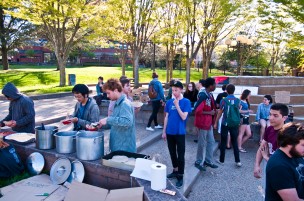The first of May signified International Workers’ Day, and several University students, in conjunction with other Middletown residents, organized a variety of events in honor of the occasion. Planned events included the revitalization and reclaiming of a community garden located between Washington Street and Pearl Street, a teach-in at Middlesex Community College, and, to conclude the day, a citizens’ assembly in Spear Park at the intersection of William and Main Streets.
The desire to organize these events came out of momentum resulting from Occupy movements and community meetings, called encuentros, which also focused on community engagement.
“It came out of a group of people who had been doing various different measures ever since Occupy started,” said activist Ross Levin ’15. “What inspired this May Day action was the desire to bring encuentro to the streets, and instead of having a private meeting, we’d have a public meeting and a lot of reaching out into Middletown.”
Each of the May Day events was arranged through the efforts of different groups of people throughout the community.
“We wanted to get in one big [movement] that really captured the sentiments of the people in our group, and a lot of people are angry about what is going on the in the world,” Levin said. “People shouldn’t be angry and frustrated in isolation, because a lot of other people are going through the same things, so before this semester ended, we wanted to get in one really good way for people to come together over these sorts of things.”
A group of several Middletown residents involved in resisting the divestment of several Washington Street homes helped initiate the new garden project.
The event description invited members of the community to “help revitalize a community garden that is under threat from the proposed strip mall construction” and help “reclaim space from private interests and cultivate it in service of our community.”
Stephen Krevisky, a professor of mathematics at Middlesex Community College and community activist, predominantly organized the teach-in at the school, which featured several different speakers, including Joanne Sheehan of the War Resisters League, Stanley Heller of the Middle East Crisis Committee, and other Middletown activists.
“We wanted to get people involved in a variety of forms of activism, and I think through these different gatherings—encuentros as we call them, or batista-style community gatherings—we can give people from the town and the colleges the chance to speak up about different social issues, be it war, the sequestering of budget cuts, or corporate takeovers,” Krevinsky explained.
Krevinsky has been actively involved in activism for decades, participating in peace marches and sit-ins related to a variety of causes, including the protesting of the Vietnam and Iraq wars. Now, as a citizen of Middletown, he has wanted to create a similar environment of striving for change in the community.
“We’ve been hoping to pull something together that could energize people, build community and dialogue, and make some things happen around here about a lot of issues that people care about,” Krevinsky said.
The May Day events emphasized unifying groups of individuals of varying backgrounds through discussion of shared concerns and interests surrounding current happenings in the world.
“For me, it’s really about building community and building a group of diverse people who are connected through the long term through these sorts of [sentiments],” Levin said. “These sorts of events have really come from the existence of that type of community that’s based in resisting oppression and injustice and working towards a better life for everyone.”
The general citizens’ assembly that culminated the day of gatherings had a relaxed atmosphere and included free food.
“Among the folks at the People’s Assembly, the workers might be concerned about wages, the students about debt, the poor folks about welfare, and the old folks about social security—but when we come together in dialogue with one another, we see that all our grievances are connected,” wrote participant Daniel Plafker ’15 in an email to The Argus. “Our seemingly disparate struggles are really one struggle against capitalist exploitation and the hierarchical state. No problem is an individual problem; these things are products of the structural elements within society.”
According to Andrew Olson ’16, the environment was positive. He enjoyed meeting different members of the community and especially liked participating in constructive and insightful conversation.
“May Day is about people coming together in the community,” Olsen said. “It was a good-natured sort of meeting, but people were talking about serious issues.”
Olson described the assembly as hugely successful, and the group of attendees agreed to start a new tradition of meeting in the park every Friday to partake in similar discussions.
“The more we spread our activism into Middletown, the better, and there is so much that we can learn from the citizens of Middletown.” Olson said. “Even if you don’t identify with their backgrounds or beliefs, they are so passionate, and it was an extremely positive experience that I came away feeling so energized from.”
If the May Day proceedings are considered successful and spur more interest, Krevinsky and Levin foresee the reoccurrence of these events for future years.
“I’m hoping that there could be more on-going connections between the Wesleyan campus, Middlesex Community College, and community people in the long run and in the short run,” Krevinsky said.

Comments are closed